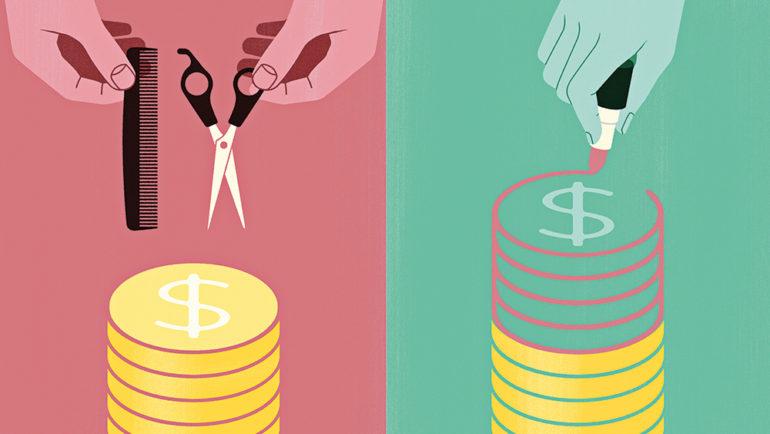Hollywood Hairstylists Fight for Pay Equity With Their Makeup Counterparts
By Zoe Hewitt
LOS ANGELES (Variety.com) – In production, no two departments seem more connected than hair and makeup. Makeup artists and hairstylists belong to the same union local — 706. They share the same work trailer, stay on set for the same hours and often even work on the same actor at the same time.
Yet, in an industry where contract negotiations last for months and every cent must be justified, hairstylist department heads make almost $650 less per week than their counterparts in the makeup department, according to the Showbiz Labor Guide’s IATSE Basic West Coast Agreement contract. And even though the application of “favored nations” practices often mitigates the disparity, the contractual reality persists.
Local 706 outgoing president Sue Cabral-Ebert says the difference in pay is rooted in gender, going back to the days when men were makeup artists and women did hair. “It’s discrimination,” she says, and “it’s ingrained in the culture.”
Hairstylist X, who prefers to remain anonymous for fear of career retribution, points out that each department “works the same hours, and both have special artistic skills.” Hairstylist Y, also anonymous, further highlights the pay inequity, noting that stylists must go to school “for 1,600 hours and be licensed by the state of California, yet makeup artists don’t have to have any credentials, and still they get paid more.” Also, hairstylists must pay to renew their licenses regularly in order to work on union projects, while makeup artists aren’t required to have any formal training or regulated credentials.
“We’ve been trying for 25 years to get pay equity, [but] we’re not the ones who hold the purse strings,” Cabral-Ebert says. “The producers are. We’re trying to make it so they can’t say no, whether it’s through legislation or a court decision.”
A makeup artist, who also prefers to remain anonymous, agrees: “It should be fair across the board. It would be different if they were hiring lower-quality hair people, but that’s not the case. Sometimes on a show the hairstylist has [decades of experience]; the fact that their [contracted] numbers are lower is just insane.”
Studios’ use of the favored nations practice often minimizes the difference in pay, budgeting the same amount for both makeup and hairstylist department crew. But there’s little consistency in the way the practice is applied. Hairstylists say that at times favored nations is stated up front when they accept a job; at other times it’s offered only after some pushback.
The pay equalization measure doesn’t always apply. Day checkers — crew who come on for shorter stints — still must contend with the lower rates. Another sector where favored nations falls through the cracks: TV commercials, which are supposed to adhere to the same hiring structure as films and TV shows but follow a different pattern. Films and shows employ both makeup and hair department heads, followed by their first assistants, called the “key,” but commercials disregard that structure in negotiated contracts to save money.
Hairstylist X explains that on commercials, though there should be a hair department head, hairstylists instead are paid as makeup assistants, a practice specifically prohibited, since hairstylists and makeup artists, as two separate branches of the union, cannot be each other’s assistants. If a commercial doesn’t require a lot of hairstyling, the makeup artist or an actual makeup assistant steps in to do the job, which also violates union rules, because makeup artists are not allowed to work on hair.
If a commercial demands a great deal of hairstyling, a makeup artist will bring in the stylist and the production will pay that person as an assistant, though his or her title on the call sheet is hair department head. That way everything appears to be proper, says hairstylist Y, who adds that the practice “is not just common, it’s rampant.” Yet, there’s little recourse for hairstylists, who generally work at the makeup artist’s recommendation on commercials; pushback would mean not getting called again.
The union has a process for submitting grievances in order to police productions that don’t adhere to their contracts. But hairstylists say that any complaints they make to the union would only result in being fired and blacklisted from further commercials work — and many stylists work almost exclusively in the sector. “The union says, ‘We don’t know about it unless you report it,’ and then you report it and the [production] knows you reported it, because who else will?” posits hairstylist X.
Still, the stylist sees a potential solution. “There should be a system where they track [hiring] at the payroll companies. When they cut checks and see there’s a key makeup person and a makeup assistant and no hair, they should know.”
When Cabral-Ebert is asked about alternatives for members to file grievances that would protect their identity, she notes: “There are other methods; I just don’t feel free to discuss them. We’ve got contract negotiations.” She further suggests that making favored nations status official for hair and makeup crews is “a question for producers, who are controlling the situation.”
Studios did not respond to calls and emails for this story.
Crew members are passionate about what they do and want equal pay for their labor. “We’re not businesspeople,” says hairstylist Y. “We’re artists who love our jobs.”

